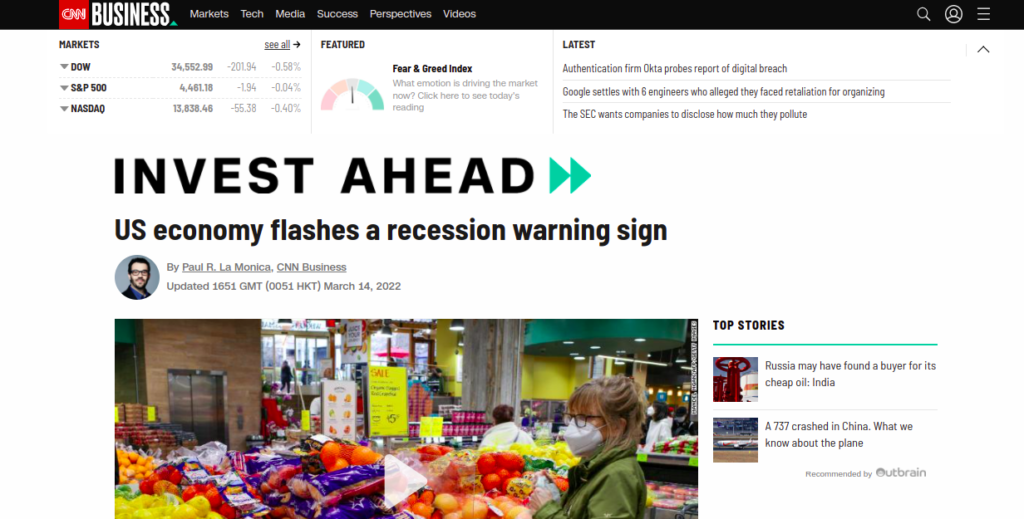As warnings about a potential U.S. economy recession circulate, concerns about escalating trade wars and fluctuating interest rates have created an atmosphere of uncertainty. The recent heavy losses in U.S. markets, particularly following tariff impositions by China, Mexico, and Canada, have left investors uneasy about the future. Consumer sentiment, reflected by the University of Michigan index, has seen a significant decline, indicating that confidence in economic growth is waning. With a stock market crash looming on the horizon, economists urge that these factors could catalyze a downturn. As the Federal Reserve deliberates potential interest rate cuts, the impact of these developments on American households and businesses remains critical, marking a pivotal moment in economic stability.
The prospect of a downturn in the American economy is becoming increasingly imminent, prompting discussions around indicators of economic distress. With rising tensions stemming from international tariffs, alongside prevailing concerns over consumer trust and market fluctuations, analysts are sounding alarms regarding the risk of recession. The interplay between fiscal policy decisions and their effects on public sentiment hints at a complex economic landscape where fear of stagnation could cripple growth. Additionally, the influence of increasingly volatile markets presents a stark reminder of past financial crises, leaving many to ponder the robustness of the current economic framework. As the possibility of stagnation grows, the ramifications on fiscal health and everyday Americans underscore the urgency of understanding these economic signals.
Understanding the Current U.S. Economy Climate
The current economic climate in the United States reflects a precarious balance between growth and potential recession. Many analysts have raised concerns regarding key indicators such as decreasing consumer sentiment and stock market volatility. According to the University of Michigan’s consumer sentiment index, confidence among consumers has plummeted to its lowest levels since late 2022, suggesting that the general populace may be bracing for economic hard times ahead. The underlying issues such as high levels of uncertainty and fluctuating trade policies play a significant role in shaping these sentiments.
Furthermore, the ongoing trade war with China, Mexico, and Canada exacerbates fears of a recession looming on the horizon. Such conflicts not only disrupt trade flows but also erode consumer confidence and investor stability. As tariffs increase and retaliatory measures are enacted, many sectors of the economy face heightened risks, leading to trepidation among investors. This scenario suggests that if these challenges persist, the U.S. could face severe economic slowdowns akin to the historic recessions in the past.
Frequently Asked Questions
What are the key indicators of a U.S. economy recession warning?
Key indicators of a U.S. economy recession warning include declining consumer sentiment, fluctuations in interest rates, and the potential for a stock market crash. Recently, the University of Michigan’s consumer sentiment index has dropped significantly, signaling reduced confidence in economic growth.
How does the trade war impact the U.S. economy recession warning?
The trade war can amplify recession warnings by increasing tariffs on American goods, leading to decreased trade activities and heightened uncertainty among investors. This can result in reduced consumer spending and overall economic slowdown.
What role do interest rates play in U.S. economy recession warnings?
Interest rates significantly influence the U.S. economy; when the Federal Reserve raises rates, it can slow down economic growth by making borrowing more expensive. Conversely, cutting rates might stimulate the economy, but uncertainty from external factors like trade wars can complicate these decisions.
Is rising consumer sentiment a positive sign against U.S. economy recession warnings?
Rising consumer sentiment can counter U.S. economy recession warnings, as it typically indicates increased consumer confidence, which often leads to higher spending and economic growth. However, when consumer sentiment falls, as seen recently, it raises concerns about a potential recession.
Can a stock market crash signal an imminent U.S. economy recession?
Yes, a stock market crash can signal an imminent U.S. economy recession. As the stock market declines, it often reflects dwindling investor confidence, which can lead to reduced spending and investment, further contributing to an economic downturn.
What are the potential consequences of a U.S. economy recession?
The potential consequences of a U.S. economy recession include rising unemployment rates, decreased consumer spending, lower business investments, and possible long-term stagnation in economic growth. A recession can also lead to significant shifts in government policy regarding interest rates and fiscal spending.
How can the Federal Reserve respond to U.S. economy recession warnings?
The Federal Reserve can respond to U.S. economy recession warnings by adjusting interest rates, either lowering them to stimulate economic growth or raising them to control inflation. The Fed must carefully balance these actions in light of the prevailing economic conditions.
What factors could worsen U.S. economy recession warnings in 2025?
Factors that could worsen U.S. economy recession warnings in 2025 include escalating trade tensions, governmental fiscal crises, erratic policy changes, and increased perceptions of risk among consumers and investors.
| Key Point | Details |
|---|---|
| Recession Warning | Analysts worry about a potential recession due to factors such as trade wars and falling consumer sentiment. |
| Impact of Tariffs | Most economists argue tariffs are harmful, with recent U.S. tariffs exacerbating market instability. |
| Market Conditions | U.S. markets have seen losses as trade tensions escalate with key trading partners. |
| Consumer Sentiment | The University of Michigan consumer sentiment index is at its lowest since November 2022, indicating decreased consumer confidence. |
| Federal Reserve Actions | The Fed is in a difficult position, needing to balance interest rates to support the economy while controlling inflation. |
Summary
The U.S. economy recession warning has become more pronounced amidst ongoing trade tensions and declining consumer confidence. With increasing risks such as a volatile stock market and potential government spending cuts, experts are cautioning the possibility of a recession within the coming year. The Federal Reserve now faces a critical choice between stimulating economic growth through interest rate cuts or managing inflation—an indication of the broader economic instability at play. Investors and policymakers alike must remain vigilant as the situation evolves.
